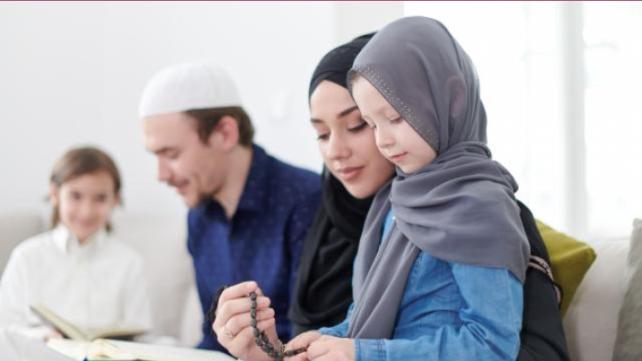
The Islamic way of upbringing, also known as tarbiyah, is deemed an essential responsibility that is tied to each one of us, as parents, caretakers, and educators. It is Allah, who has entrusted us with this responsibility of guardianship over the dependents under our care.
“Indeed each of you is a shepherd and each of you will be questioned regarding his flock. The commander who is in authority over people is responsible and he will be questioned regarding his responsibility. The man is responsible over the inhabitants of his house and he is the one who will be questioned about them. The wife is responsible in her husband’s house and she will be questioned about it. The servant is responsible regarding his master’s property, and he will be questioned about it. Indeed each of you is a shepherd and each of you will be questioned about his flock.” (Al-Bukhari and Muslim)
Parenting is undoubtedly a huge responsibility, especially in present times where we are faced with multitudinal challenges. For a believer, the strength and motivation comes from knowing that our responsibilities can become the source of great reward and blessings, in shaa Allah.
While there is a plethora of parenting resources available online and in bookstores, nothing comes close in comparison to the practical guidance by way of the Sunnah of our beloved Prophet, peace and blessings be upon him.
Practical Parenting Tips from the Sunnah
We most commonly assume that tarbiyah has more to do with spiritual and behavioral development, however, these two aspects account for just a part of it. There is surely more to complete the package. Not only did the Prophet, peace and blessings be upon him, emphasize the importance of nurturing good character but also exemplified the development of skills, intellect, devotion or worship, and creed or beliefs.
Here are six practical ways to nurture our future generations according to the teachings of the Prophet Muhammad, peace and blessings be upon him.
1. Be steadfast in your worship.
“When any one of you sees anything that is disapproved (of by Allah), let him change it with his hand. If he is not able to do so, then let him change it with his tongue. And if he is not able to do so, then let him change it with his heart, though that is the weakest (kind of) faith.” (Muslim)
Parents are often in a quandary about when to start talking or rather teaching our children about Islamic values, conduct, and beliefs. The truth is, it has to start right from the beginning if we want them to grow up with an understanding of Islam and develop a love for its teachings.
Teach them the power of the verses of the Quran by reflecting on their significance. Listen to or read the Quran together. Make a conscious decision to incorporate it into your daily life. We can play the Quran in our homes as part of our morning routine or at any other specific time during the day. Listening to the Quran while you are in the car is also a great way of keeping you connected as a family.
There are stories from the life and teachings of our Prophet Mohammed, peace and blessings be upon him, when he would go to the masjid with his grandsons Hassan and Hussain and they would climb over on top of his back, during prayers. It is noteworthy that the Prophet did not express any signs of irritation related to that behavior. Instead, he lengthened his prostration to establish a connection of happy memories associated with the act of worship.
Encouraging our younger generation to perform acts of worship, such as having them to accompany you to the masjid as often as possible, can help sow the seeds for devotion and steadfastness. In addition to this, it can help highlight the benefits that come along with the beauty of congregational prayers, which include receiving Allah’s blessings and rewards manifold, protection from all evils, and in fostering a greater sense of community. When children can see other children engaging in worship at the masjid, it helps fulfill feelings of validation and self-confidence in their Muslim identity. This is especially true with children being raised in the West.
Be sure to also familiarize them with the sahabah, those closely associated with the Prophet Muhammad, peace and blessings be upon him. This includes his companions as well as his wives and other members of his family. By telling their stories, parents can aid children in visualizing and understanding the qualities of a true believer including the extent to which one should be willing to stand firm on the guidance that Allah so mercifully provides.
2. Strengthen them physically.
“A strong believer is better and dearer to Allāh than a weak one, and both are good. Adhere to that which is beneficial for you. Keep asking Allāh for help and do not refrain from it.” (Muslim)
This hadith sheds light on the importance of seeking physical strength. During the time of the Prophet, peace and blessings be upon him, children were entrusted to the care of the Bedouins, where they could be raised in a natural and healthy environment and learn the basics of survival from an early age. The Prophet received vigorous training from the time he was a child and was a shepherd himself. He also demonstrated bravery in fighting from a tender age, when he participated with his tribe in the war of al-fijaar, protecting his tribesmen from the arrows of their enemies.
This teaches us the significance of not limiting our focus towards nurturing moral bravery alone, but also supporting our children’s physical skills through activities such as martial arts, swimming, horse riding, hiking, archery, and other means of engaging in age appropriate strength training. This is true for both boys and girls.
We must also be mindful of the need to inculcate healthy eating habits at an early age as another means of nurturing physical strength. The earlier we start, the better.
3. Pray for them.
Once the Prophet, peace and blessings be upon him, saw Hassan and Hussain, so he said: “O Allah, I love them, so love them.” (Tirmidhi) He loved children and would often make duaa for them.
One of the best things that a parent or guardian can give to a child is duaa, for duaa alone has the power to alter fate through the will and decree of Allah. It is the single most important source of providing assurance that Allah will not turn down what we ask of Him, unless He feels it is not the right time for it, and of course He is Al-’Aleem, The All Knowing.
No matter how small the ask may be, as long as it is rightful and permissible, we must not feel ashamed of praying for our children. Even when they are older and self-sufficient, a parent should continue to pray for their child’s guidance and virtue so that they can be successful in this life and the hereafter.
There are numerous duaas that were made by the Prophet, peace and blessings be upon him, which enjoin us to ask for goodness and righteousness for our children. Some of these have been compiled into book form and others can be found in narrations of ahaadith. All serve as a great reference for Muslim parents around the world.
4. Display the best of character.
“Nothing is weightier on the Scale of Deeds than one’s good manners.” (Bukhari and Muslim)
It is evident how much the Prophet, peace and blessings be upon him, stressed the importance of possessing good manners. His supreme character bears witness to this, as even the disbelievers in his time acknowledged it. He was also popularly known by the local Arab tribesmen as As-Sadiq (truthful) and Al-Ameen (trustworthy), and looked over their wealth in their absence.
There is the famous instance of an old woman who used to throw garbage at the Prophet, peace and blessings be upon him, every time he would pass by her house. Not once did the Prophet snub her by way of his actions or words. In fact, on a day when he was passing by the same route and did not happen to see her, he inquired about her. It was brought to his attention that she was ill, so he went to visit her and offered to help during her illness. This act of mercy and humbleness roused the woman to embrace Islam. It leaves us to reflect on observing good conduct ourselves. We must learn to be conscious of our actions, reactions and choice of words, and encourage our children to do the same. Again, it behooves us to start when they are young.
The above example also inspires us to teach our children that when they are going through a particularly challenging phase, they must not disregard the mercy of Allah, learn to confide in Him, and continue to bear with patience for the ultimate greater good.
5. Fulfill your rightful duty toward them.
“Allah has called them the ‘dutiful’ (al-Abrar) because they are dutiful (birr) to their parents and children. Just as you have a duty which you owe your parents, so you have a duty which you owe your child.” (Al Adab Al-Mufrad by Bukhari)
No one has ever said that parenting is a piece of cake! We need to understand that our children are not just a responsibility which can be taken care of casually, but rather a duty which is entrusted upon us by Allah.
This holds us accountable to Him for our children's right to legitimacy, proper care and nourishment, shelter, proper education and sources of seeking beneficial knowledge, and skills training. Parents are also obligated to set firm rules and boundaries in order to nurture devotion towards Allah and other religious matters.
6. Express your love for them.
A’isha, may peace be upon her, reportedly said,
“A bedouin came to the Prophet, peace and blessings be upon him, and asked, ‘Do you kiss your children? We do not kiss them.’ The Prophet said, ‘Can I put mercy in your hearts after Allah has removed it from them?’” (Al Adab Al-Mufrad)
There is no shame whatsoever in expressing love to your children. We must take every opportunity to hug them, compliment them and tell them how much they truly mean to us (as a blessing from Allah). This can have a powerful impact on their self-confidence and how they see the world through their own eyes.
Prophet Muhammad, peace and blessings be upon him, not only expressed his love for children openly but also displayed a certain level of respect towards them and their feelings. This teaches us the significance of confiding in our children, and how that, too, can indirectly serve as a great strategy for their guidance and support.
There are tons of tips and information available online (in the form of videos and written material) and in books about parenting. As Muslim parents, we have the best source of inspiration on the topic from our beloved Prophet Muhammad, peace and blessings be upon him. Strength and motivation can also come from knowing that parenting can be a source of great reward and blessings, if fulfilled correctly. Use the details of his life to guide your way. And also associate with like-minded people and families who share these same views. The effort will pay off both in this life and in the hereafter, in sha Allah.
Umm Ahmed is an early childhood educator and writer who is passionate about seeking knowledge and passing it onto others. She and her husband are parents to three boys and are currently living in Abu Dhabi.





Add new comment